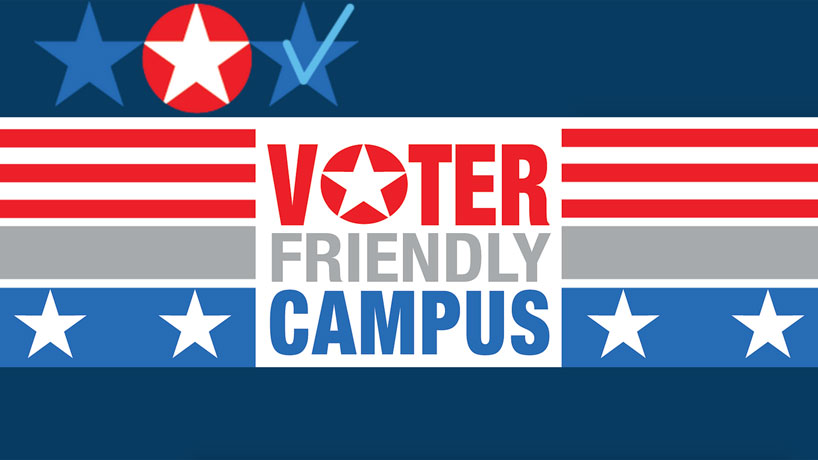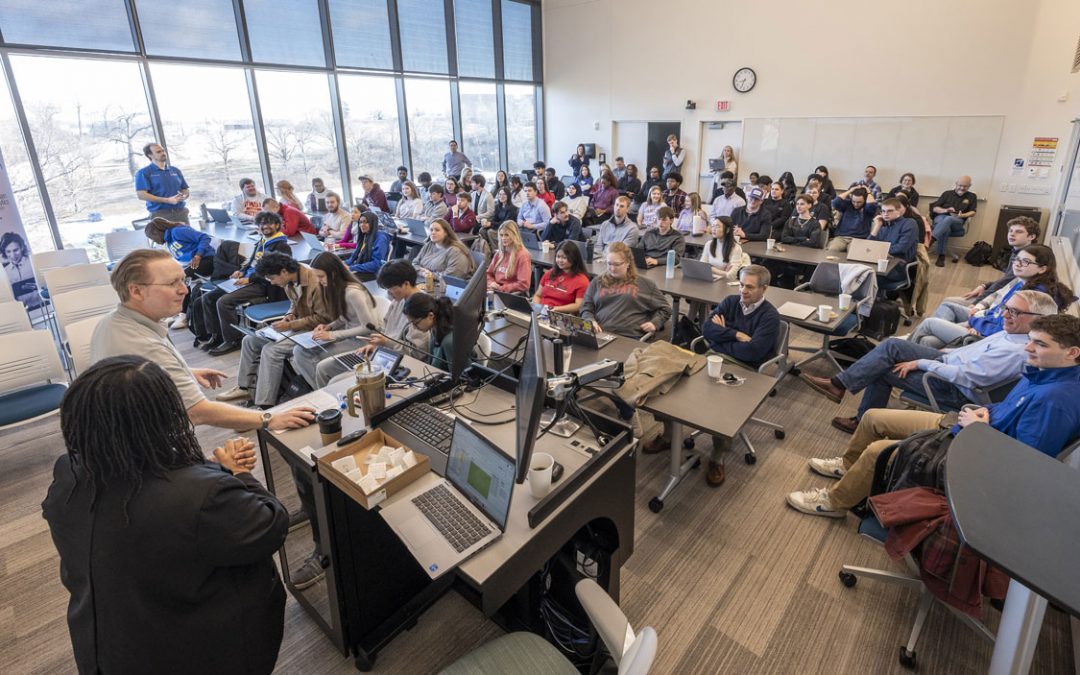
UMSL was one of 83 campuses in 23 states designated a “Voter Friendly Campus” as part of an initiative by the Campus Vote Project and NASPA – Student Affairs Administrators in Higher Education.
Enhancing civic engagement for the economic and social well-being of the entire region has been part of the mission of the University of Missouri–St. Louis since its inception.
Voting is perhaps the most fundamental way students, faculty and staff can be civically engaged, and members of the campus community have been working to promote voter participation.
Their efforts have not gone unnoticed as UMSL this week became one of 83 campuses in 23 states designated as a “Voter Friendly Campus.” The designation is meant to bolster efforts that help students overcome barriers to participating in the political process.
The initiative, led by the national nonpartisan Campus Vote Project and NASPA – Student Affairs Administrators in Higher Education, held participating institutions accountable for planning and implementing practices that encourage their students to register and vote in the 2016 general election and in the coming years.
“We’re a higher education institution where people should be able to share ideas and learn from them to make a difference in their community and to feel that they have the tools to do that,” said Patricia Zahn, director of community outreach and engagement and the Des Lee Collaborative Vision, who spearheaded UMSL’s participation in the initiative. “We want students to have the confidence and the understanding. I think this recognition represents that we are a place that tries to embrace that work of civic engagement and tries to address the challenges.”
UMSL is one of three schools in Missouri to be recognized with a designation that will be valid through December 2018. Saint Louis University and Washington University in St. Louis were the others.
Zahn learned of the initiative late last spring through the university’s involvement with the American Democracy Project and went to work getting UMSL involved.
In July, she brought together a diverse group of people from across campus and formed the UMSL Civic Engagement Coalition.
Included in the coalition are representatives from the Office of Academic Affairs, the Office of Admissions, the Center for Ethics in Public Life, the Gender Studies program, the Office of Residential Life and Housing, the Division of Student Affairs, the Office of Student Administrative Services and the Office of Student Involvement as well as people from the Sue Shear Institute for Women in Public Life, the Associated Students of the University of Missouri, the Student Government Association, Sustainability/Environmental Health & Safety, the University Program Board and the Departments of Communication & Media, English and Political Science.
Their biweekly meetings last summer were designed to be a venue for sharing ideas for programming and to strategize for activities in the months leading up to the 2016 elections.
They also worked to coordinate voter registration efforts around campus and created a Frequently Asked Questions sheet that, among other things, offered answers to how and where to register to vote.
“We wanted to be able to message and get information out to our students so that they can find out what’s going on and how to become informed about the elections, about the issues and do that with a more concerted effort,” Zahn said.
The fall calendar featured events such as watch parties for the first and third U.S. Presidential Debates between Donald Trump and Hillary Clinton; a “Huge Election” panel discussion with political science professors Dave Robertson, David Kimball and Anita Manion; and a more locally concentrated discussion with state and city politicians hosted by the Associated Black Collegians.
“I think part of receiving the recognition is that we were able to say, ‘We’ve been doing these things,’” said Zahn, who noted that similar events populated the calendar in the run-up to previous elections. “We are trying to create a place where people can be informed citizens, that they can be engaged in the political process, and we’ve been given an opportunity to really kind of highlight that and celebrate it and then ask ourselves how do we continue and improve.”
That is a challenge going forward.
Interest in politics and participation in voting tends to wane outside presidential election cycles. The coalition, which has continued to meet monthly since last summer, is working to combat that with activities such as lunch-and-learn events that bring legislators to campus to discuss issues of local import.
“We’d like to see more people – more of our students and everyone – become involved in local elections too,” Zahn said. “They don’t get the notoriety, but we have more input in them. School board elections, local alderman elections. … So to take the attention that’s being paid at the national level and to really use that to keep that momentum going, to keep people engaged.”















